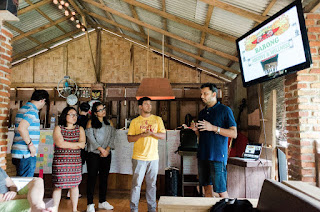by Alwyn Loh, Strategy & Management major, Global MBA 2017-2018 | Singapore
On the 6th of September, just over a week after starting in the Global MBA program, ESSEC sent the Singapore cohort to the jungles of northern Sumatra to the Hotel Orangutan for a Design Thinking and Jungle Innovation start-up course. The journey there was a rough one, with a flight to Medan, followed by a four-hour bumpy ride to our final destination – Bukit Lawang. This is the last stronghold of the critically endangered Sumatran Orangutan, and they differ genetically from their Borneo counterparts. With only 6000 or so of the species left in the jungle, I was excited to see what would transpire from the trip.
A long trek through the jungle the next day ensued and we were privileged enough, with the aid of our trekking guides, to spot at least six orangutans in the wild. Whilst I have seen them in the Singapore Zoo previously, the experience of seeing them out in their natural habitat gave rise to a very different feeling. One that recognizes the importance of conservation and that it should be a priority to preserve the UNESCO heritage jungles that they inhabit.
ESSEC had arranged for Neal Cross, DBS’ Chief Innovation Officer (CIO), recently voted the world’s most disruptive CIO, and founder of Hotel Orangutan, to brief us on the situation, how the Hotel Orangutan came into fruition and gave us an overview of the lean start-up process of Design Thinking that we were to embrace over the next three days. In short, it was a course about thinking completely out of the box, and challenging the status quo of assumptions that underlie our basis of reasoning and exploring solutions. We were broken up in teams to find solutions to saving the Orangutan as a species, and to improve the overall economic status of the village at Bukit Lawang. Both were intertwined with each other and off we went.
By embracing the Design Thinking process of speaking to locals, stakeholders and doing ground research, the Global MBA cohort eventually crafted several different proposals that would simultaneously address both challenges. My team did not win, but our simple proposal to create an integrated online booking site for guest houses, adventures, activities; coupled with a lower transaction fee model was picked up for future prototyping. We learned that there are many holes in every proposal that may sound good at a glance, and that sometimes, it is ok to give up on an idea and to “pivot” onto something new, even though that process comes across as being undesirable at times.
Through this experience, we ate local food, slept in more spartan conditions than most are used to in Singapore, bathed in cold water and woke up each morning to the hordes of monkeys disturbing our sleep, with insects of all kinds finding their way into the bathroom despite being apparently sealed up. The experience certainly brought our close-knit class closer together, and for me personally the most memorable activity during the trip was partaking in river rafting after our trek was over, back to the Hotel Orangutan.
Apart from the time spent on our lean start-up work, Neal also lectured us on the art of salesmanship, the importance of being able to pitch ideas quickly and efficiently, and encouraged us to support social enterprises in the course of our lives. By being so far away from the developed world and tightly integrating learning “inside” and outside of the classroom, I felt that the experience was a memorable and enjoyable one, and believe that as it gets tweaked in future iterations, future Global MBA students will also find it to be a much more fulfilling and enriching exercise.
Learning to work with people of diverse backgrounds, experiences, and cultural interpretations of problems and challenges presented takes much work, but it is worth it in the end. Although my team was the smallest one with just three members, I felt that the mini diversity of a Singaporean, French and Indian National certainly contributed to the diversity of discourse, originality of thought and willingness to experiment and try to solve problems differently. Whilst there are no perfect individuals, I believe that all three of us came out stronger from this somewhat intense experience in forging a partnership for a greater social good.
Although I have previously served my National Service in my younger days as a Singapore citizen, this adventure once again opened my eyes to the opportunities, quality of life and things that I so often take for granted in Singapore. I remain thankful for this experience and for ESSEC in continuing to invest heavily into the student learning and teaching experience, whether in formal or informal ways. I look forward to the following twelve months of the Global MBA program, as it continues to shape my intellect, thoughts and perspectives on business and life.












No comments:
Post a Comment